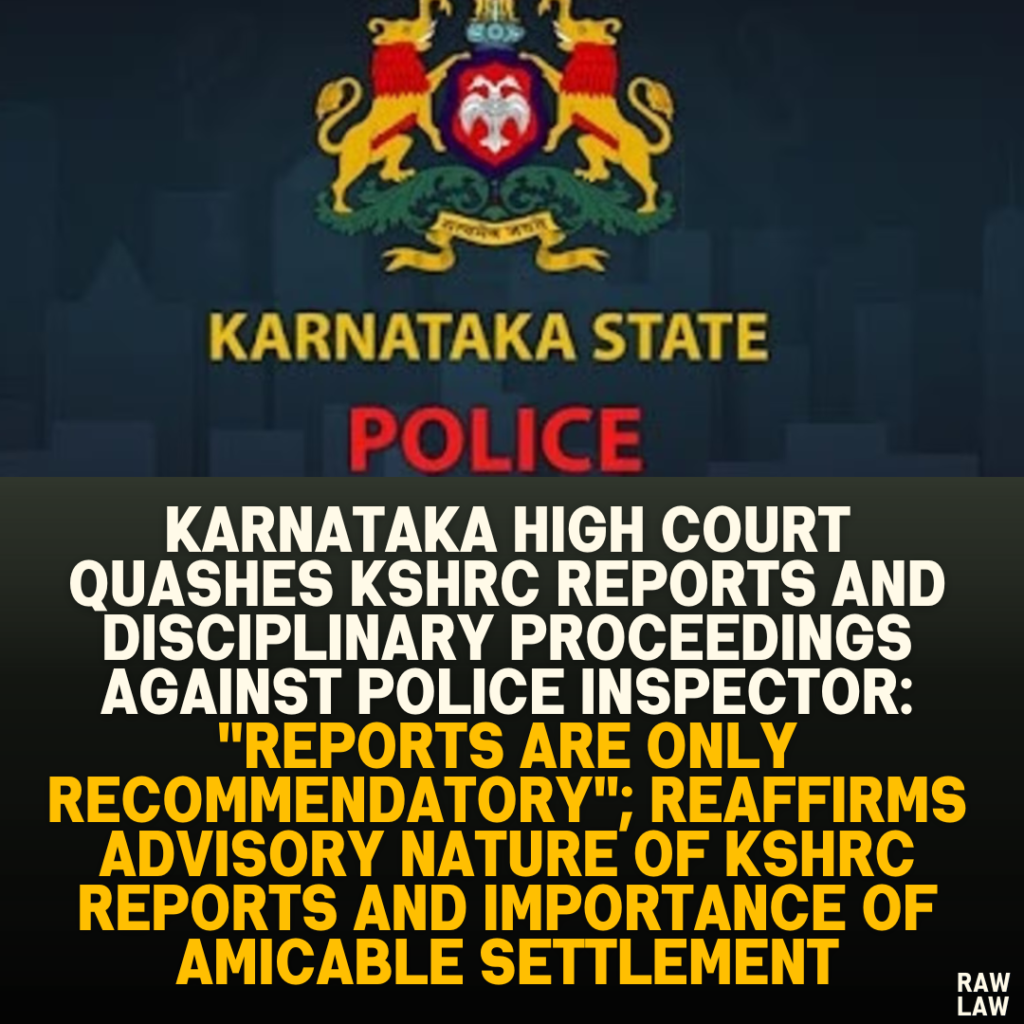Court’s Decision
The Karnataka High Court quashed two reports issued by the Karnataka State Human Rights Commission (KSHRC) dated 4th May 2022 and 26th May 2022, along with orders passed by the KSHRC based on these reports. The court also ordered the closure of the disciplinary proceedings initiated against the petitioner (a Police Inspector) that stemmed from these reports. Justice Krishna S. Dixit remarked that the reports were only “recommendatory in nature” and that they posed a risk of adversely impacting the petitioner’s service career.
Facts
- The petitioner, a Police Inspector, challenged the reports and orders issued by the KSHRC, arguing they were unnecessary and unjustified.
- The case involved an incident on 27th November 2021, for which the 4th respondent lodged an FIR against the petitioner on 29th November 2021. The FIR was registered as Crime No. 226/2021. A counter-FIR was also filed by another individual, Prakash S/o Shankar Reddy, at around the same time (Crime No. 227/2021).
- Both FIRs were registered promptly after the incidents, and the petitioner contended that there was no delay or wrongdoing in processing the complaints.
- Subsequently, a settlement was reached between the complainant (4th respondent) and the counter-party. This was formalized through a Deed of Confirmation dated 29th August 2022, in which the 4th respondent received ₹25,00,000 to amicably resolve all disputes.
Issues
- Are the reports issued by the KSHRC enforceable against the petitioner?
- Should the disciplinary proceedings initiated based on these reports be allowed to continue?
Petitioner’s Arguments
- Timeliness of Actions: The petitioner argued that the FIRs were filed promptly and as per procedure. A preliminary inquiry was conducted in line with the guidelines laid down by the Supreme Court in Lalita Kumari v. Government of Uttar Pradesh (2014), which permits such inquiries before registering an FIR.
- Settlement of Dispute: The petitioner emphasized that the matter had been settled between the involved parties, with the 4th respondent receiving ₹25,00,000 as a settlement amount, as recorded in the Deed of Confirmation.
- Non-Binding Nature of KSHRC Reports: The petitioner argued that KSHRC reports are merely advisory and do not carry legal authority. He also expressed concern that the reports and subsequent disciplinary proceedings could harm his career.
Respondent’s Arguments
- Advisory Nature of Reports: The KSHRC’s counsel argued that its reports are only recommendatory and not legally binding. It was open to the petitioner to present his case to the State Government, which would make a decision based on the reports.
- Precedents Supporting the Advisory Role of KSHRC: The counsel referred to the Karnataka High Court’s decision in C. Girish Naik and Others v. State of Karnataka and Others, which held that KSHRC reports are not enforceable by themselves.
- Disciplinary Inquiry Justified: The respondents argued that the disciplinary proceedings were justified based on the contents of the KSHRC reports.
Analysis of the Law
- Nature of KSHRC Reports: The court analyzed the legal framework governing the KSHRC and reaffirmed that its reports are only advisory. While they may carry persuasive value, they do not have the force of law or binding authority.
- FIR Registration: The court referred to the principles laid down in Lalita Kumari v. Government of Uttar Pradesh, which allow a Station House Officer (SHO) to conduct a preliminary inquiry before registering an FIR. The court found no fault with the petitioner’s actions, as both FIRs were registered within a reasonable timeframe.
- Impact on Career: The court considered the potential adverse effects of the KSHRC reports and disciplinary proceedings on the petitioner’s service career. It noted that such proceedings were unwarranted, especially given the amicable settlement of the dispute.
Precedent Analysis
- Lalita Kumari v. Government of Uttar Pradesh: This case established that police officers could conduct a preliminary inquiry to ascertain the truthfulness of allegations before registering an FIR. The court found the petitioner’s actions consistent with this precedent.
- C. Girish Naik and Others v. State of Karnataka and Others: This decision confirmed the non-binding nature of KSHRC reports, further supporting the petitioner’s case.
Court’s Reasoning
- The court found no delay in the petitioner’s handling of the FIRs, noting that they were registered promptly after the incidents.
- The court acknowledged the settlement between the parties, as documented in the Deed of Confirmation. The settlement rendered the KSHRC reports redundant.
- While recognizing the advisory nature of KSHRC reports, the court highlighted the risk of such reports being misused to initiate unwarranted disciplinary proceedings.
- The court emphasized that allowing the disciplinary inquiry to continue would be “unfair” to the petitioner, given the amicable resolution of the dispute.
Conclusion
The court allowed the petition and quashed the KSHRC reports, orders, and disciplinary proceedings against the petitioner. It observed that the reports were “only recommendatory in nature” and that they had been rendered moot by the settlement between the parties. The court directed that the disciplinary inquiry be closed.
Implications
- Clarification on KSHRC’s Role: The judgment reaffirms that KSHRC reports are advisory and do not carry legal enforceability.
- Protection of Public Servants: The decision protects public servants from unwarranted career repercussions arising from non-binding reports.
- Importance of Settlement: The judgment underscores the significance of amicable dispute resolution, particularly when it resolves the underlying issues in a case.
